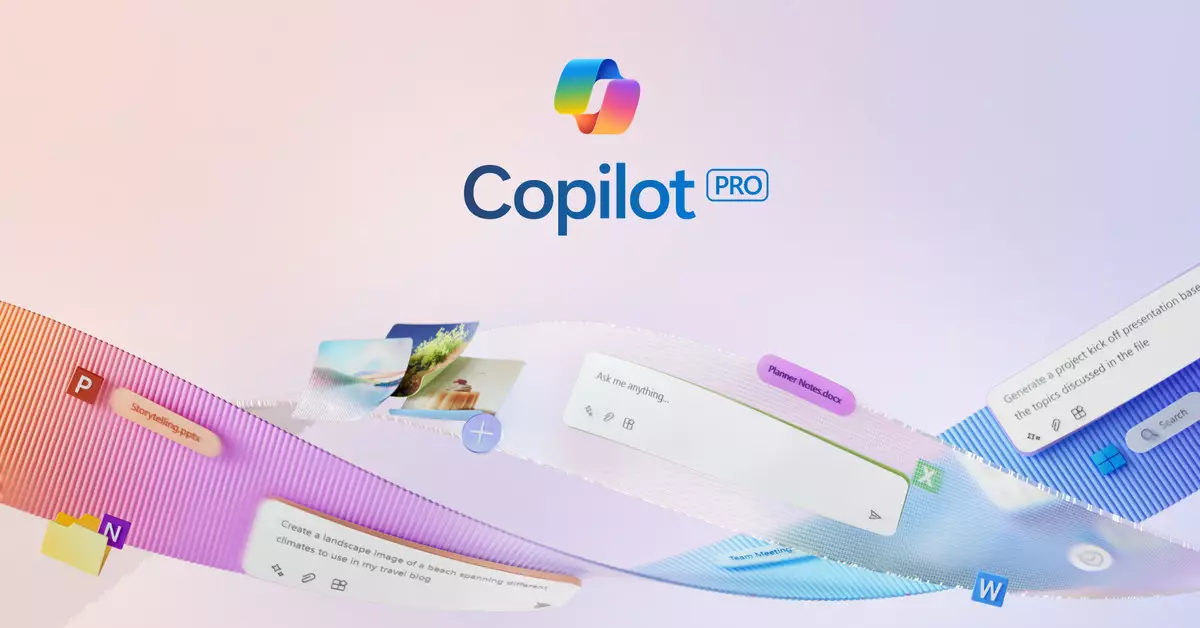The tech landscape is consistently evolving, and companies must pivot in response to user feedback and market dynamics. Recently, Microsoft has made a notable change to its subscription model for Microsoft 365, particularly concerning its AI-driven features. While this move could be seen as a strategic enhancement for subscribers, it simultaneously raises questions about pricing, value propositions, and market positioning.
Notably, Microsoft has decided to integrate its popular AI features, branded as Copilot Pro, into the existing Microsoft 365 Personal and Family subscriptions. Initially, it seemed that subscribers would incur an additional cost of around $20 monthly to access these advanced functionalities. However, in a swift pivot, the company has included these features without the hefty price tag in specific regions like Australia, New Zealand, Malaysia, Singapore, Taiwan, and Thailand. This decision illustrates a dynamic approach to customer engagement, reflective of Microsoft’s commitment to listening to its user base.
As detailed in a press release, Microsoft has taken nine months to refine Copilot based on user interaction and feedback. The integration not only includes Copilot’s benefits for its widely used applications—like Word, Excel, PowerPoint, and Outlook—but also extends to the Microsoft Designer app. A monthly allotment of AI credits will be provided to allow users to experience Copilot in their creative and functional tasks. This seemingly generous offer aligns with the tech giant’s goal of making AI tools more accessible to a broader demographic, yet it raises the specter of how Microsoft defines “value.”
While expanding access to AI features could be perceived as an enhancement, Microsoft is simultaneously opting to increase subscription prices across these selected markets. For instance, Australian subscribers will see monthly fees increase by $4 AUD for Family subscriptions and $5 AUD for Personal subscriptions. This dual approach of expanding features while hiking fees could give the impression of consumers not benefiting as they should from this new AI integration.
Microsoft justifies these price hikes by stating that they are necessary to reflect the increasing value provided to users over the years and to facilitate continued innovations. However, the discrepancy between the previous premium expected for Copilot Pro and the current, more modest adjustment raises important considerations regarding consumer loyalty and satisfaction. Many subscribers may be left feeling ambivalent, questioning whether the improvements warrant the extra costs, especially in a market where competitive subscription options abound.
The Implication of a Targeted Approach
The decision to initially roll out these changes in select countries signals a testing phase for Microsoft. The company is likely observing how these price adjustments and feature enhancements are received before deciding on broader rollouts in more lucrative markets like the U.S. and Europe. This cautious approach demonstrates Microsoft’s strategic finesse; rather than plunging headfirst into potential backlash, they are gauging consumer reactions.
However, such targeted experimentation also creates a narrative of disparity among global users. While a section of the user base may gain access to enhanced features for an increased price, others, particularly those in North America and Europe, remain in the dark. This situation can create friction and dissatisfaction amongst subscribers who feel left out of innovations and changes that have potential implications on their subscription value.
Microsoft’s latest adjustments regarding Microsoft 365’s Copilot Pro feature integration bring a mix of opportunity and uncertainty. While expanding access to AI-powered functionalities may enhance the user experience, increases in subscription costs could leave many questioning the balance of value-for-money. As the company navigates this new territory, it remains crucial for Microsoft to communicate clearly to its users about how these changes truly benefit them, lest it risks straining long-standing customer relationships in a fiercely competitive tech landscape. The coming months will be critical in understanding how this experiment will set the stage for the future of Microsoft 365 subscriptions.

